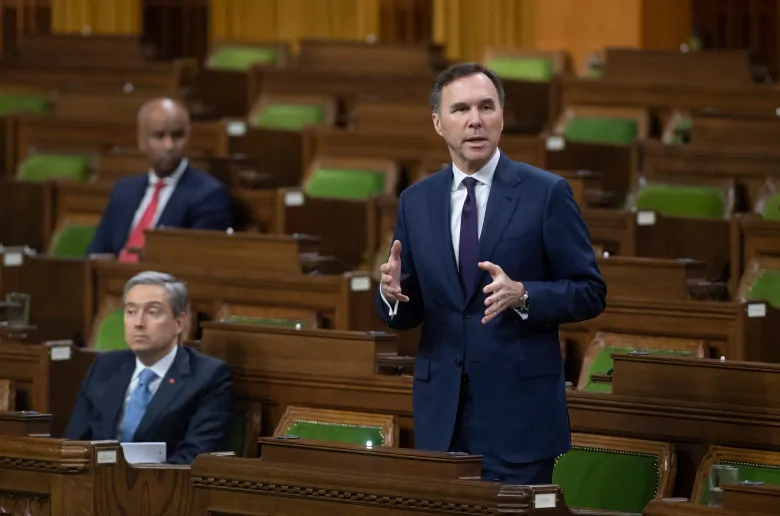The government and opposition parties in Parliament have passed an $82 billion aid package bill to help Canadians struggling during the COVID-19 pandemic — legislation that will boost access to employment insurance and other programs that will flow money to workers and businesses in need.
Prime Minister Justin Trudeau addresses the country after the government’s proposed bill for an $82-billion aid package for Canadians was passed in the House of Commons. 0:00
The government and opposition parties in Parliament have passed an $107 billion aid package bill to help Canadians struggling during the COVID-19 pandemic — legislation that will boost access to employment insurance and other programs that will flow money to workers and businesses in need.
The House of Commons passed the legislation early Wednesday morning after a late night of tense negotiations to limit the Liberal government’s ability to spend more money without parliamentary approval.
The Senate heard from Finance Minister Bill Morneau Wednesday, who painted a grim picture of the state of the Canadian economy — saying it was essential for Parliament to approve a plan to get money to Canadians in need as a time when hundreds of thousands of workers are facing unemployment.
Morneau said Canada is suffering an “enormous” number of job losses right now, but the government hopes and expects those losses will be temporary. Morneau was taking questions from senators who wanted details on how the new Canada Emergency Response Benefit would actually work.
Under the legislation, Morneau said, workers would have access to as much as $2,000 a month for four months.

Canadian workers over the age of 15 who have earned more than $5,000 in the last 12 months but are now earning no income because of the COVID-19 pandemic would qualify. Workers, including freelancers, will have access to the CERB even if they do not have access to the current employment insurance (EI) program.
Morneau, responding to a question from a senator, said the government needs to ensure that employment will be there for people when the pandemic is over. The current situation, he said, is “absolutely unprecedented.”
The bill, as initially pitched, was worth about $82 billion but Morneau said Wednesday the price tag has increased sharply to $107 billion because the forthcoming emergency response benefit is more generous and will be available to more people.
He said Ottawa has now budgeted for $52 billion in direct support payments and $55 billion in tax deferrals.
‘I have no interest in scoring political points’
The bill’s passage in the Senate was all but guaranteed after the Opposition Conservatives in the Commons secured key concessions from the government on some parts of the bill the Tories described as a blatant “power grab.”
At least three parts of the bill were removed or amended, notably the sections that granted the government unlimited tax-and-spend powers until the end of 2021. As written, the bill now grants the government unlimited spending power until June 2020. The legislation also includes “sunset clauses,” so that parts of the bill come to an end if they’re not reauthorized by Parliament through legislation.
“Few of us could have imagined being where we are today, but here we are. We are in this together, and together – with God’s help – we will get through it,” Conservative Senate Leader Don Plett said in a speech to the chamber.
WATCH | Trudeau speaks Tuesday outside Rideau Cottage:
Prime Minister Justin Trudeau

